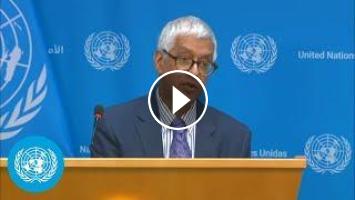Noon briefing by Farhan Haq, Deputy Spokesperson for the Secretary-General.
Highlights:
-Occupied Palestinian territory
-Lebanon
-Brazil
-Haiti
-Democratic Republic of the Congo
-Ukraine
-Myanmar
-Human security exhibition
-Noon guest tomorrow
OCCUPIED PALESTINIAN TERRITORY
The Office for the Coordination of Humanitarian Affairs (OCHA) reports that, as of last night, some 80,000 people have been displaced from Rafah since Tuesday, when the Israeli military’s ground operation there began.
Most of those displaced people are seeking safety in Khan Younis and Deir al Balah. These areas lack the basic services needed to support civilians who need food, shelter and health care.
No humanitarian assistance – or the fuel to power our aid operations – has been able to enter through the Rafah crossing in recent days.
The World Food Programme (WFP) reports that its main warehouse in Gaza is now inaccessible. It says that only one bakery is still working and that supplies of food and fuel are running out. Without them, WFP says its operations will come to a standstill.
The UN Relief and Works Agency (UNRWA) in Gaza said that some hospitals will start shutting down their generators in three days if we don’t get fuel in. UNRWA said that, as of today, its facilities are down to almost no fuel, rationing the small amount that is still in place in Gaza.
The UN continues to engage with all involved on the resumption of the entry of goods, including fuel, to begin managing incoming supplies.
Yesterday, OCHA – alongside UNRWA, the UN Mine Action Service, and the UN Department of Safety and Security – were at the Kerem Shalom and Rafah crossings to assess the security situation. The area is highly militarized, making it impossible for organizations to distribute at the scale they previously did. The situation remains extremely fluid, and the UN continues to confront a range of challenges, amid active hostilities.
Meanwhile, debris on the roads has made these routes impassable for the time being. The UN is exploring alternative solutions, including use of the fence road or other routes.
LEBANON
The daily exchanges of fire across the Blue Line are deeply concerning, profoundly impacting towns and villages on both sides.
Many people have been displaced, injured, and killed, including today.
The United Nations Interim Force in Lebanon (UNIFIL) is working continuously to decrease tensions with hundreds of daily activities aimed at de-escalating situations and assisting local communities within its mandate. The ultimate solution can only be political and diplomatic.
The UN urges all parties to reaffirm their commitment to the cessation of hostilities and to upholding their obligations under Resolution 1701.
BRAZIL
In a statement issued on Wednesday (9 May), the Secretary-General said he is deeply saddened by the loss of lives and damage caused by heavy rains and flooding in the south of Brazil.
He extended his condolences and solidarity to the Government and people of Brazil, as well as to the families of the victims.
The Secretary-General also noted that disasters such as this are a reminder of the devastating effects of the climate crisis on lives and livelihoods.
And he reiterated that the UN team on the ground stands ready to assist at this difficult time.
The Resident Coordinator in the country, Silvia Rucks, is leading the UN team's response. This includes shipping emergency supplies and monitoring the spread of disease, supporting shelter and related needs, and distributing emergency kits and monitoring children and adolescents, some of whom have been separated from their families.
HAITI
The Office for the Coordination of Humanitarian Affairs (OCHA) says that the UN and its partners are responding in the wake of recent attacks in the commune of Delmas, which is in the capital, Port-au-Prince.
Meals, shelter and other supplies have been provided to the displaced people and host community, and the hope is to ramp up this assistance as security allows.
This week, the World Food Programme distributed food to 264,000 schoolchildren and more than 5,600 displaced people in Port-au-Prince.
WFP also distributed food to people in Cité Soleil, one of the most insecure neighbourhoods in Port-au-Prince, reaching some 26,000 people this week.
Since the beginning of March, WFP has reached more than 680,000 people.
It has distributed more than 800,000 hot meals to more than 94,000 displaced people in the Port-au-Prince metropolitan zone. WFP has also distributed school meals to more than 330,000 school children across the country.
Also, since the start of March, the UN and its partners have distributed 8.4 million liters of drinking water to nearly 70,000 displaced people in Port-au-Prince.
Full Highlights: https://www.un.org/sg/en/content/noon-briefing-highlight?date%5Bvalue%5D%5Bdate%5D=09%20May%202024
Highlights:
-Occupied Palestinian territory
-Lebanon
-Brazil
-Haiti
-Democratic Republic of the Congo
-Ukraine
-Myanmar
-Human security exhibition
-Noon guest tomorrow
OCCUPIED PALESTINIAN TERRITORY
The Office for the Coordination of Humanitarian Affairs (OCHA) reports that, as of last night, some 80,000 people have been displaced from Rafah since Tuesday, when the Israeli military’s ground operation there began.
Most of those displaced people are seeking safety in Khan Younis and Deir al Balah. These areas lack the basic services needed to support civilians who need food, shelter and health care.
No humanitarian assistance – or the fuel to power our aid operations – has been able to enter through the Rafah crossing in recent days.
The World Food Programme (WFP) reports that its main warehouse in Gaza is now inaccessible. It says that only one bakery is still working and that supplies of food and fuel are running out. Without them, WFP says its operations will come to a standstill.
The UN Relief and Works Agency (UNRWA) in Gaza said that some hospitals will start shutting down their generators in three days if we don’t get fuel in. UNRWA said that, as of today, its facilities are down to almost no fuel, rationing the small amount that is still in place in Gaza.
The UN continues to engage with all involved on the resumption of the entry of goods, including fuel, to begin managing incoming supplies.
Yesterday, OCHA – alongside UNRWA, the UN Mine Action Service, and the UN Department of Safety and Security – were at the Kerem Shalom and Rafah crossings to assess the security situation. The area is highly militarized, making it impossible for organizations to distribute at the scale they previously did. The situation remains extremely fluid, and the UN continues to confront a range of challenges, amid active hostilities.
Meanwhile, debris on the roads has made these routes impassable for the time being. The UN is exploring alternative solutions, including use of the fence road or other routes.
LEBANON
The daily exchanges of fire across the Blue Line are deeply concerning, profoundly impacting towns and villages on both sides.
Many people have been displaced, injured, and killed, including today.
The United Nations Interim Force in Lebanon (UNIFIL) is working continuously to decrease tensions with hundreds of daily activities aimed at de-escalating situations and assisting local communities within its mandate. The ultimate solution can only be political and diplomatic.
The UN urges all parties to reaffirm their commitment to the cessation of hostilities and to upholding their obligations under Resolution 1701.
BRAZIL
In a statement issued on Wednesday (9 May), the Secretary-General said he is deeply saddened by the loss of lives and damage caused by heavy rains and flooding in the south of Brazil.
He extended his condolences and solidarity to the Government and people of Brazil, as well as to the families of the victims.
The Secretary-General also noted that disasters such as this are a reminder of the devastating effects of the climate crisis on lives and livelihoods.
And he reiterated that the UN team on the ground stands ready to assist at this difficult time.
The Resident Coordinator in the country, Silvia Rucks, is leading the UN team's response. This includes shipping emergency supplies and monitoring the spread of disease, supporting shelter and related needs, and distributing emergency kits and monitoring children and adolescents, some of whom have been separated from their families.
HAITI
The Office for the Coordination of Humanitarian Affairs (OCHA) says that the UN and its partners are responding in the wake of recent attacks in the commune of Delmas, which is in the capital, Port-au-Prince.
Meals, shelter and other supplies have been provided to the displaced people and host community, and the hope is to ramp up this assistance as security allows.
This week, the World Food Programme distributed food to 264,000 schoolchildren and more than 5,600 displaced people in Port-au-Prince.
WFP also distributed food to people in Cité Soleil, one of the most insecure neighbourhoods in Port-au-Prince, reaching some 26,000 people this week.
Since the beginning of March, WFP has reached more than 680,000 people.
It has distributed more than 800,000 hot meals to more than 94,000 displaced people in the Port-au-Prince metropolitan zone. WFP has also distributed school meals to more than 330,000 school children across the country.
Also, since the start of March, the UN and its partners have distributed 8.4 million liters of drinking water to nearly 70,000 displaced people in Port-au-Prince.
Full Highlights: https://www.un.org/sg/en/content/noon-briefing-highlight?date%5Bvalue%5D%5Bdate%5D=09%20May%202024
- Category
- United Nations
- Tags
- UN, United Nations, Naciones Unidas
Be the first to comment













